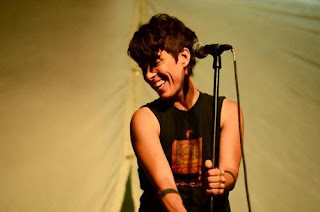New York Movie
Word count: 405
| New York Movie, 1939 by Edward Hopper |
At first, she seems to just be another audience member in
the theater. Perhaps waiting to use the bathroom? Or on a bad date and needed
to step out for a moment to sulk?
Then her blue jumpsuit draws me in and hints towards her being
more than that. She’s not there to enjoy a nice movie on a Saturday night.
Rather, she is an usher presumably exhausted after a day of work. She looks to
the ground with one hand touching her face and the other arm supporting her
elbow as if there’s an invisible table under it.
The sudden burst of bright light into a dark scene cuts this
scene into three physical worlds: the woman is in her world within her brightly
lit hallway, the audience is getting lost in the movie playing in their dark
world, and the movie itself is laying out a different world for the audience to
jump into. The woman does not jump.
And while the audience’s gaze is transfixed onto the movie
playing in front of them, mine is on the woman in blue.
She seems to be lost in thought. Maybe dreaming about how
quickly she will sprint out of this theater to get home the minute that last
audience member leaves the building. She’ll utter her goodnights to the
cleaning staff and shove her way out the doors into the sharp burn of the
winter city air. Buttoning up as she walks, she’ll begin her trek home.
In the five blocks that she needs to walk to get home she’ll
pass the usual scenery: a storefront with blackened windows which she’s been
walking past for long enough to know it used to be a pretty crappy Chinese
restaurant; a flower stand that she stops by at least once a week to pick up
some violets on her way home (For who?); the café where she buys her coffee
every morning and afternoon (and tea on the evenings that she’s not as eager to
get home).
They all pass her by and, normally she’d be more aware, but
it was a particularly long day and she only has eyes for the burgundy front
door that’s about 20 feet and a set of porch stairs away. There’s flower boxes in the
windows and a soft glow coming out from behind them.
Who
is waiting for her at home? A husband? A wife? A spoiled cat? Edward Hopper
himself?


Yes, interesting. Jessica chose the same picture. I think that's because Hopper does visual narrative really well. Most of his work seems to tell or story or be part of an interrupted moment. I like the surprise here--that we have another person observing her, someone who is curious and interested and has a creative mind. So then, that person, the "I" becomes someone who I want to know even more than I want to know the story of the woman in blue. This is the sentence that hooks me: "And while the audience’s gaze is transfixed onto the movie playing in front of them, mine is on the woman in blue. " From there, I want to know why it is that the observer is so interested in her.
ReplyDeleteIs this person observing from a safe and harmless distance or is the narrator capable of possibly following her home to find out who/what is waiting for her? Is this a man or a woman observing? Why is this person watching her instead of the movie? No revision needed, just know that by having a narrator watching someone who is unaware creates an extra tension to the scene, and could lead to a longer, more complicated story line. Nice work.
That's funny, I had no idea that Jessica chose the same picture. I only chose it because it came up in a conversation I had with a friend a couple weeks ago so it was still on my mind. I actually wanted to play around with who the observer was because I thought it was an interesting story line as well but it kept getting too long and I couldn't find a way to make it work out the way I wanted it to. I'm glad you liked it though.
ReplyDeleteWhen I opened your story I found it interesting because my image took place in London. It is quite intriguing how different painters respond to their surroundings. I liked how you wrote your story as the narrator watching the individual. I also thought it was really different how you left the story off because it makes the reader question and create their own story in their head.
ReplyDelete